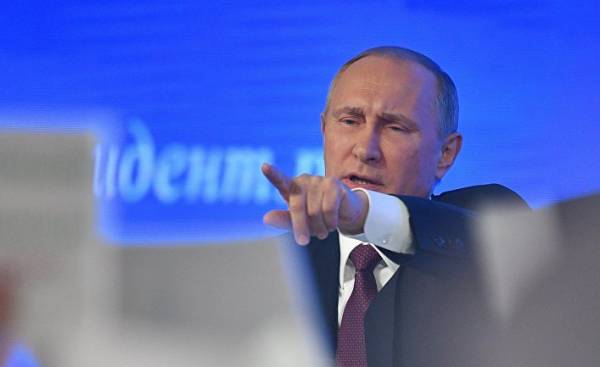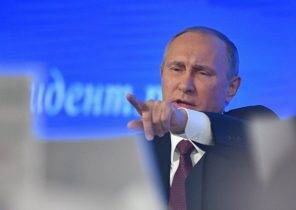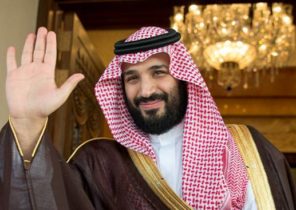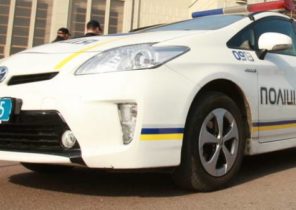
Vladimir Putin is very well aware, what kind of power can have a media, which helped his unpopular predecessor, Boris Yeltsin, re-elected for a second term in 1996. Therefore, taking the presidency in 2000, he immediately forced the main Russian TV channels, which still are an extremely powerful tool for influencing the population of the country, to obey his will. Oligarchs who owned these TV channels, or forced to cooperate or sent to prison or forced to leave, and by 2006, all major Russian media directly or indirectly under the control of the Putin administration.
Today, three main Russian TV channel, either directly owned by the state, as state-owned enterprises (“the First channel” and VGTRK), or owned by a subsidiary of the largest Russian oil and gas companies “Gazprom” (NTV). The same can be said about two of the three major news agencies, Russia today and TASS. A little later, a major independent online publication, such as Lenta.ru too were subordinated by replacing their manual from team of people, loyal to the Kremlin.
Members of the Putin administration — today the Deputy head of the administration Alexei Gromov — control the coverage of political events and decide what the news need to lighten up, as they need to cover and, above all, lighting is not necessary. For example, to discuss family members of Putin is strictly prohibited, unless special order. This often leads to awkward moments like, for example, when Putin suddenly announced their divorce on national television after the end of the Opera, to which he came with his now ex-wife Lyudmila.
Chief editors of major Russian media regularly attend “strategic meetings”, held by the representatives of the Putin administration. It’s like Fight club: nobody recognizes its existence, however, given the level of consistency of coverage in the popular TV show on the three major TV channels, its existence seems obvious.
Putin and his entourage pay close attention to the foreign press. His administration signed on all main Russian Newspapers and magazines, including the few remaining independent publications (the word “independent” in this case is not quite correct: of course, they are dependent on the benevolence of the state, which may at any time to change your attitude to them), and most of the major foreign publications like focus (Economist) and more specialized (Jane’s Defence Weekly). Secretaries read and analyze the materials and daily reports of their contents to his superiors.
These stacks of foreign Newspapers and magazines, with notes in red for negative articles about Russia, yellow for neutral and green for positive — was a serious source of anxiety to the Putin administration in the mid-2000s years. Since then most of the marks were red and yellow, press representatives, Putin was concerned about the image of Russia in the international arena. They feared that communication between senior Russian officials and international press there was a disconnect, because they took quite a reasonable solution, inviting foreign specialists in the field of public relations to solve this problem.
This strategy gave not quite the same results, which was calculated due to a complete lack of understanding how the press works outside of Russia. Angus Roxburgh (Angus Roxburgh), a former BBC correspondent who later worked as an adviser to the Russian government’s public relations, wrote in his book “Strong leader: Vladimir Putin and the struggle for Russia” (The Strongman: Vladimir Putin and the Struggle for Russia) that his employers sincerely believe that you just need to bribe the right people to get the required coverage.
It spent tens of millions of dollars, but then it was mutual disappointment, and at the end of 2014, the Kremlin has refused to renew the contract with the foreign experts. Today, Putin and his press representatives, apparently, still believe that the world’s press works on the same principles as the press in Russia — that is, that it is subject to the desires of their corporate owners, which are in turn controlled by governments. Hence the angry demands of Russian high-ranking officials, insisting that “Western media” — from their point of view, it is, apparently, about some editorial conglomerate, which is controlled by the centre — ceased “Russophobic campaign.”
From their point of view, reporters working for state news outlets — almost all publications are state — is first and foremost civil servants, and then the journalists (if, indeed, journalists). In September 2013, in the midst of the mayoral election, the state news Agency “RIA Novosti”, which later became part of the “Russia today”, tried to talk about the candidates in the spirit of the old traditions of journalism. The problem was that one of the candidates (a favorite among liberal-minded Muscovites, who came second and almost Navaselchan the second round of elections) was widely known opposition activist Alexei Navalny, which the state media refused to tell me.
Every time the “RIA Novosti” quoted by Navalny in his articles dedicated to the campaign — any normal news outlet would have done the same thing — the Deputy head of Putin’s administration, Alexei Gromov called the chief editor of the Agency Svetlana Mironyuk and chastised her. According to him, the state news Agency should not interfere with the interests of the government, promoting the opposition.
Today, the Russian government has adopted a rough and soft power to strengthen its control over the Russian media. New restrictive laws are passed with discouraging predictability: the owners of foreign media franchises are forced to give up their stakes in international brands such as Forbes or Esquire operating in Russia, and for coverage of such complex topics as terrorism, or drug abuse, no outright condemnation introduced fines and other penalties. Independent media are gradually forced to put them in published reports of self-censorship, and they cut off access to the resources they need to survive — cable services or access to stores printed materials — if they refuse to obey.
Of course, the picture cannot be considered absolutely hopeless. Outside of Moscow has left brave news sites that are critical coverage of events at the local level, causing dissatisfaction with the local governors. A new niche publication covers in detail topics such as charity work or the courts and prisons, which are usually not discussed major social and political publications.
In the Russian media feel pressure from the government, but also the constraints that the media face around the world: we are talking about accelerating the race to increase the number of hits on the background of General decline of interest in their audiences, shrinking budgets and falling revenues from advertising. This in turn opens up new possibilities for manipulating the content of the reports through more traditional means.
Every year in December, Putin holds his annual press-conference for national and foreign media. It is widely advertised and rigidly planned event, which brings together hundreds of reporters from a variety of publications, from small regional Newspapers to international media conglomerates. No matter what position against Putin you occupy, you are obliged to cover this press conference in order not to lose web traffic, although nothing particularly new there’s usually not talking. These events usually have no place in any serious announcements concerning policy, and Putin’s got a lot of rhetoric above are designed to interfere with or divert the conversation away from critical issues. He uses the faithful representatives of the media who ask him easy questions that he could look omniscient and wise ruler.
The Putin administration is masterful manipulation tools. The empty and banal scraps of information fed to reporters by “sources knowledgeable about this matter,” and ultimately even critical publications are beginning to promote the Kremlin line, passing what is, in essence, the news is not.
Undoubtedly, it is possible to extract a lot of lessons and spend a lot of Parallels with the current complex relationship between Donald trump and American media. However, it is important to remember that Putin has managed to concentrate in their hands more power than trump could ever hope to receive during the entire presidential term. But one thing is clear: in the United States and Russia, the media often focus on absurd behavior and meaningless public statements, ignoring what the authorities don’t want to focus the attention of the public.







